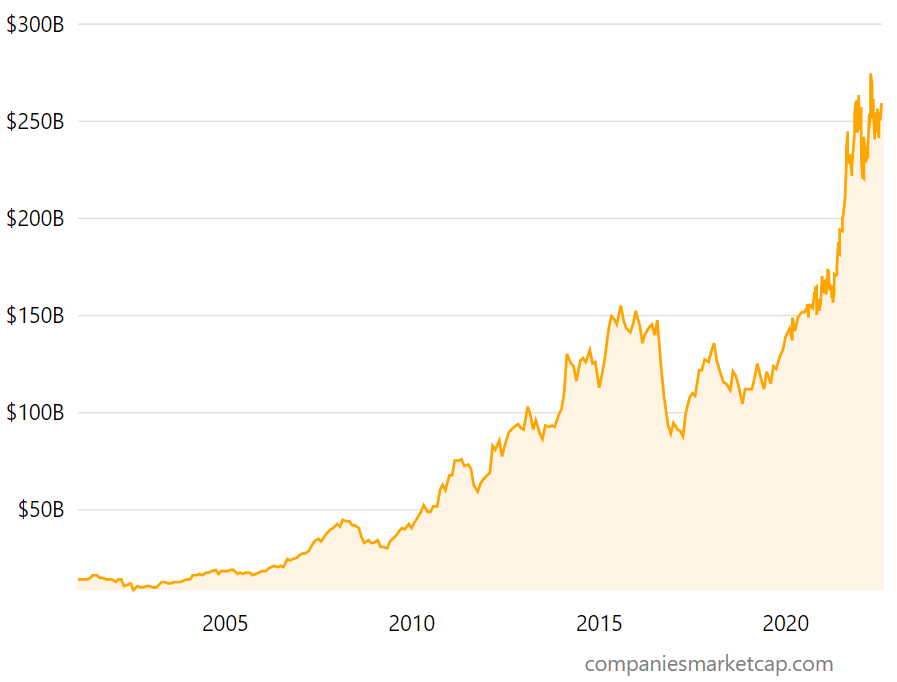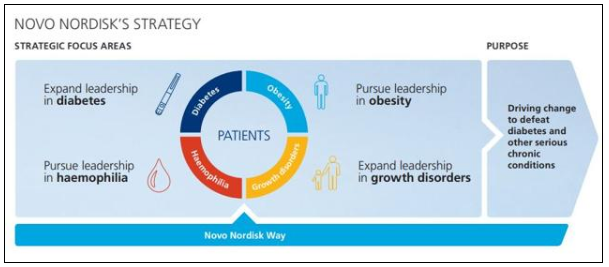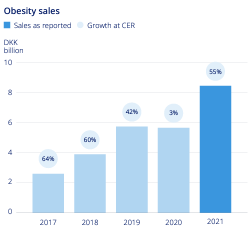Introduction
Novo Nordisk is a leading company in the global health sector that applies emerging technologies and evidence to meet the diverse medical demands of persons living with hormone-related disorders, obesity, and diabetes. This organization has succeeded in innovating and presenting a wide range of drugs in different parts of the world (Garvey, 2022). The use of a proper business model, continuous research and development (R&D), and identification of changing patients’ needs are key factors contributing to its success. The company operates internationally to offer devices capable of helping more patients transform their life experiences.
The adoption of the unique selling proposition (USP) is a powerful framework that delivers high-quality products associated with good manufacturing practices (GMPs). The company identifies endocrinologists and medical professionals who offer treatment for the three conditions. In terms of market capitalization, latest statistics indicate that it currently has a total value of 259.12 billion U.S. dollars (Novo Nordisk, 2021). This figure indicates that it is presently the 33rd most valuable organization in the world today (Novo Nordisk, 2021). The nature of these observations reveals that the company will be on the frontline towards achieving greater results in the near future.

Since 2000, Novo Nordisk has introduced powerful strategies that are taking organizational performance to the next level. The key successful market is that of pharmaceutical products intended to treat patients with diabetes. Within the past two decades, this corporation has combined innovation and R&D to develop and market a wide range of products in the European market (Phillips and Clements, 2022). By promoting sustainable and corporate social responsibility initiatives, Novo Nordisk has created a reputable brand name that supports the differentiation, usefulness, and acceptability of its drugs and devices.
The consideration of market trends and environmental trends are some of the efforts most of the leaders at this organization take seriously. Specifically, the company identifies patients’ changing health needs and the problems associated with chronic conditions (Garvey, 2022). Novo Nordisk partners with local communities to launch numerous projects that are in tandem with the needs of most of the clients. The provision of drugs developed using modern technologies and sustainable practices help deliver the overall CSR strategy. The marketed drugs are usually distributed using processes that are sensitive to the changes associated with the natural environment.
Similarly, the success of this brand could be attributed to the combination of the aspects of the 4P marketing mix. Specifically, Novo Nordisk ensures that the available drugs are of the highest quality, acceptable, and capable of treating patients to record positive health outcomes (Ishak, Mohamed and Ahlem, 2018). The company identifies pharmaceutical outlets, community centers, and hospitals to partner and support the marketing of the available drugs. Novo Nordisk goes further to consider competitive prices that ensure that the products are affordable. This approach complements the wider business model and sustainability goals associated with the company (Lingvau et al., 2022). Finally, promotional activities and community-based programs are pursued in an effort to sensitize more people about the products and how they can help them manage their chronic illnesses.
To achieve most of the anticipated goals, Novo Nordisk considers several focus areas that resonate with the wider organizational purpose. The specific objective areas include pursuing and expanding leadership in obesity, growth disorders, diabetes, and haemophilia (see Fig. 1). The possible outcome is a successful corporation that drives meaningful change to deal a wide range of chronic illnesses. The emerging outcomes make it possible for more people to lead high-quality and longer lives (Fenwich and Wrbka, 2018). The primary focus is to empower more patients and address challenges that might be recorded.

Through the combination of the above attributes of strategy and marketing, Novo Nordisk has managed to launch additional products in the market that are intended to treat diabetes and obesity. For instance, the introduction of Saxenda® and Wegovy® has helped increase sales by around 55 percent (see Fig. 3). Similar efforts are in place whereby the company is emphasizing on Biopharm care to treat hormonal and growth problems. The emerging medications, such as ®, Refixia®, NovoSeven®, and NovoEight®, continue to drive the company’s revenues in North America and internationally (Novo Nordisk, 2021). The company has dominated the diabetes market through these key drugs: Rybelsus®, Victoza®, and Ozempic®. The latest reports of early 2022 indicated that such products accounted for 52.7% value market share (Aagaard, 2022). These attributes show that the company is on the right path towards achieving its business aims.

Segmentation, Targeting, and Positioning (STP) Strategies
Market Segmentation
Novo Nordisk has over the years been targeting specific segments of the global healthcare sector. Specifically, the company monitors patients suffering from diabetes and obesity as the primary customers for most of the leading drugs. The involved marketers partner with medical experts to help more patients manage these diseases (Blair et al., 2022). The company identifies the beliefs and health expectations of the beneficiaries while at the same time identifying the recorded market trends (Folson, 2018). Consequently, such a segmentation approach has made it possible for the company to achieve most of its intended goals.
Targeting
To remain sustainable, Novo Nordisk has mastered the art of differentiated marketing whereby individuals with chronic conditions become the primary targets. By promoting drugs that are sustainable, affordable, and healthy, this company has continued to encourage more people to support the existing business model (Lenssen and Smith, 2019). The company has proposed the idea of leadership strategy in securing the best drugs and maximizing the quality of lifelong care to patients based on their terminal conditions. Medical experts are capable of acquiring insulin and availing it to customers, thereby making it possible for Novo Nordisk to maximize its overall profits.
Positioning
In the wider healthcare sector, Novo Nordisk identifies itself as the leader in diabetes, obesity, and other chronic diseases. It markets useful products that are capable of maximizing care for patients with the identified diseases. The company offers innovative drugs delivered through collaboration and sustainable R&D practices (Fellmeth, 2020). It has gone further to secure its position by leveraging the best portfolio based on the changing needs of the patients. Its presence in the identified markets creates a new opportunity for building competitiveness and promoting scientific leadership (Shannon et al., 2019). These aspects have led to the production of high-quality drugs that meet the needs of patients affected by the identified conditions (Dyczkowska and Dyczkowski, 2018). Through this positioning strategy, Novo Nordisk has increased chances of identifying and responding to the changing demands of medical experts and patients in need of long-term and personalized care.
Conclusion and Reflection
The above analysis has identified Novo Nordisk as an organization that has remained profitable within the past two decades. The adopted marketing model has led to positive gains since it is characterized by proper segmentation, positioning, targeting, and the 4Ps mix (Zhihua, 2021). The power of R&D and focus on the changing demands of patients with terminal conditions are powerful strategies that continue to deliver positive results. The consideration of these aspects could help the company introduce additional efforts that have the potential to maximize profitability in the near future.
SWOT Analysis
Based on these findings, Novo Nordisk needs to consider most the strengths identified above and capitalize on them to improve future performance. For instance, the company can consider its R&D abilities, competent workers, and presence of diverse drugs to improve its operations to meet the needs of more patients with chronic conditions. The use of emerging technologies and consideration of opportunities in the developing world present a new idea for achieving additional results (Smith, 2019). The challenges associated with past lawsuits and complaints from different stakeholders should become guide the company’s future business model (Pasovska and Miceski, 2018). The organization can complete additional studies to learn more about the changing needs of most of the patients in different regions.
The identified opportunities present a strong case for launching additional programs intended to address the health demands of more people in the developing world. It is evident that more people are in need of better health services and drugs for their chronic conditions. The move to expand operations across the globe means that the globe can make it easier for this company to record additional profits (Hagemeyer-Witzleb, 2021). The improvement of the current business model can make it possible for Novo Nordisk to deliver high-quality drugs to treat most of the identified terminal conditions (Knox, 2020). Additionally, this organization can consider the importance of innovating and producing additional drugs to treat other diseases, such as cancer. The increasing number of people suffering from these terminal conditions could help Novo Nordisk expand its operations, attract more patients, and eventually maximize its profits.
The mitigation of risks is a possible strategy that could benefit from the current strengths. For instance, emerging business efforts, R&D, innovation, and marketing processes should be in tandem with the existing business regulations in the industry (Mujib, 2017). The leaders at this organization can consider additional measures to identify proper mechanisms to support patients from low-income families (Guda and Lyngdoh, 2018). It can launch additional programs and integrate them with its wider CSR model. The adoption of all these key proposals will help Novo Nordisk improve its global operations, attract more potential patients, and improve its operations continuously.
Reference List
Aagaard, A. (2022) Sustainable business: integrating CSR business and functions. New York, NY: CRC Press.
Blair, R.D. et al. (2022) Antitrust policy health care markets. Cambridge: Cambridge University Press.
Dyczkowska, J. and Dyczkowski, T. (2018) ‘Democratic or autocratic leadership style? Participative management and its links to rewarding strategies and job satisfaction in SMEs’, Athens Journal of Business & Economics, 4(2), pp. 193-218.
Fellmeth, A.X. (2020) Introduction to international business transactions, Northampton: Edward Elgar Publishing.
Fenwich, M. and Wrbka, S. (2018) International business law: emerging fields of regulation. New York, NY: Bloomsbury Publishing.
Folson, R.H (2018) Principles of international trade law: including the World Trade Organization, technology transfers, and import/export/customs law. St. Paul, MN: West Academic Publishing.
Garvey, W.T. (2022) ‘New horizons. A new paradigm for treating to target with second-generation obesity medications’, The Journal of Clinical Endocrinology & Metabolism, 107(4), pp. 1339-1347.
Gigliotti, G. (2018) ‘Novo Nordisk: still a safe bet under one condition’, Seeking Alpha. Web.
Guda, S. and Lyngdoh, T. (2018) ‘Pharma selling: in conversation with Melvin D’Souza, Vice President and General Manager, Novo Nordisk India Pvt Ltd’, IIMB Management Review, 30(4), pp. 385-390.
Hagemeyer-Witzleb, T.M. (2021) The international law of economic warfare. New York, NY: Springer Shop.
Ishak, K., Mohamed, F. and Ahlem, H.S. (2018) ‘How Novo Nordisk used porter’s concept of shared value achieving profitable business and healthy society. “Professional approach”’, Journal of Finance & Corporate Governance, 2(2), pp. 7-22.
Knox, R. (2020) ‘Insulin insulated: barriers to competition and affordability in the United States insulin market’, Journal of Law and the Biosciences, 7(1), pp. 1-25.
Lenssen, G.G. and Smith, N.C. (eds.). (2019) Managing sustainable business: an executive education case and textbook. New York, NY: Springer Shop.
Lingvau, I. et al. (2022) ‘Obesity definition for personalised treatment of type 2 diabetes: authors’ reply’, The Lancet, 399(10342), pp. 2189-2190.
Mujib, H. (2017) ‘Organizational identity: an ambiguous concept in practical terms’, Administrative Sciences, 7(3), pp. 28-57.
Novo Nordisk. (2021) Annual report 2021. Bagsværd: Novo Nordisk.
Pasovska, S. and Miceski, T. (2018) ‘The impact of transformational leadership in improvement of the organizational capability’, International Journal for Innovation Education and Research, 6(2), pp. 235–246.
Phillips, A. and Clements, J.N. (2022) ‘Clinical review of subcutaneous semaglutide for obesity’, Journal of Clinical Pharmacy and Therapeutics, 47(2), pp. 184-193.
Serpa, S., Ferreira, C.M. and Sá, M.J. (2020) ‘The potential of organisations’ SWOT diagnostic assessment’, Academic Journal of Interdisciplinary Studies, 9(4), pp. 93-104.
Shannon, G.D. et al. (2019) ‘Innovating to increase access to diabetes care in Kenya: an evaluation of Novo Nordisk’s base of the pyramid project’, Global Health Action, 12(1), pp. 1-14.
Smith, J. (2019) ‘FDA greenlights first oral version of Novo Nordisk’s type 2 diabetes drug’, LabioTech, Web.
Zhihua, L. (2021) ‘Novo Nordisk sees ample room for further expansion in nation’, China Daily, Web.